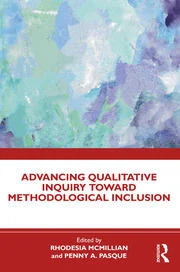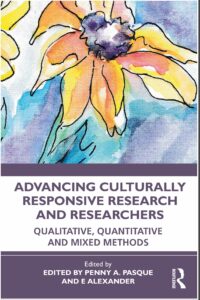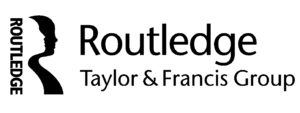Advancing Qualitative Inquiry Toward Methodological Inclusion
Edited by Rhodesia McMillian and Penny A. Pasque (2024), is a book that emerged from AMI 2023.
20% Discount Available – enter the code AFLY03 at checkout

This fascinating book provides a groundbreaking resource for innovative approaches to qualitative inquiry that address equity and justice and equip readers with tools to enact these approaches in their own work.
Comprising contributions from award-winning qualitative scholars, chapters show how methodologies can be employed to address social issues and problems from the social-political milieu including education, COVID-19, racial inequalities, health inequalities, climate change, and debates around gender diversity amongst others. This book offers the new and innovative paradigms, methodologies, and methods a cutting-edge group of scholars has crafted as well as the ‘how to’ so readers may employ these approaches in dissertations, grants, and various research team scholarship. Contributors reimagine the next generation of “rigorous” qualitative methodologies by pushing on the boundaries of existing methodological approaches as well as presenting new ways of engaging in research that prioritize innovation, equity and justice.
This unique edited volume is aimed at students and researchers studying or using qualitative methodologies and inquiry who wish to be exposed to emergent conceptualizations and innovations regarding qualitative research methodology and its congruent methods.
Edited by Penny A. Pasque and e alexander (2022), is a book that emerged from AMI 2021.
20% Discount Available – enter the code FLA22 at checkout

This book encourages readers to design and engage in methodologies and methods that place cultural relevancy at the center of inquiry. In doing so, it highlights the need to uplift voices and needs of people who have been historically marginalized in the environments that we both inhabit and engage in as part of knowledge construction.
The scholars whose work is featured in this volume take up research from different paradigmatic, ontological, epistemological, axiological, and methodological approaches – yet, with adherence to centering cultural responsiveness in all research decisions. Each chapter seeks to extend understandings of social inequities, methodologies, and/or methods – and to contribute to meaningful and evolving social change through innovative and cutting-edge research strategies. While doing this work, the authors illustrate and highlight the importance of researcher positions and reflexivity in supporting the expansion of culturally responsive approaches; they also do so while considering global sociopolitical conditions of this moment in time.
As a handbook, the volume can help faculty and advanced researchers with interest in doing culturally responsive projects to better understand frameworks, approaches, and considerations for doing so. It includes activities to support readers in developing said understandings.
*See here for the answer to the activity for Chapter 11: Detecting differential effects using regression mixture models: Applications using Mplus (Kim & Yang, 2022)


